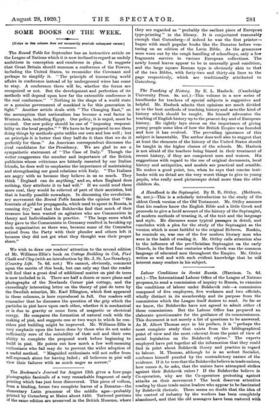SOME BOOKS OF THE WEEK.
[Notice in Ms column does not necessarily preclude subsequent review.]
The Round Table for September has an instructive article on the League of Nations which it is now inclined to regard as unduly ambitious in conception and cumbrous in plan. It suggests that Great Britain should summon a conference of the Powers, including the United States, to reconsider the Covenant and perhaps to simplify it. " The principle of transacting world affairs in conference instead of by underground wires has come to stay. A conference there will be, whether the forms are recognized or not. But the development and perfection of its methods will depend upon how far the extensible conference is the real conference." " Nothing in the shape of a world state or a genuine government of mankind is for this generation in sight." Another article deals with "The Changing East," on the assumption that nationalism has become a real factor in Western Asia, including Egypt. Our policy, it is urged, must be revised. Our new policy should be one of " imposing responsi- bility on the local peoples." " We have to be prepared to see them doing things by methods quite unlike our own and less well ; but on principle it is better that they half-do it than that we do it perfectly for them." An American correspondent discusses the rival candidates for the Presidency. We are glad to see a sympathetic statement of " The Case of Italy." Though the writer exaggerates the number and importance of the British publicists whose criticisms are bitterly resented by our Italian friends, he does well to emphasize the importance of maintaining and strengthening our good relations with Italy. " The Italians are angry with us because they believe in us so much. They think ' England can do anything,' and so, when England does nothing, they attribute it to bad will." If we could send them more coal, they would be relieved of part of their anxieties, but that is hardly possible nowadays. In discussing the revolution- ary movement the Round Table hazards the opinion that " the fountain of gold for propaganda, which used to spout in Russia, is running dry," and that the Bolsheviks find that much of their treasure has been wasted on agitators who are Communists in theory and Individualists in practice. " The large sums which they gave to the Communists in Germany resulted in breaking up such organization as there was, because some of the Comrades retired from the Party with their plunder and others left it because they did not get what they thought was their proper share."


































 Previous page
Previous page